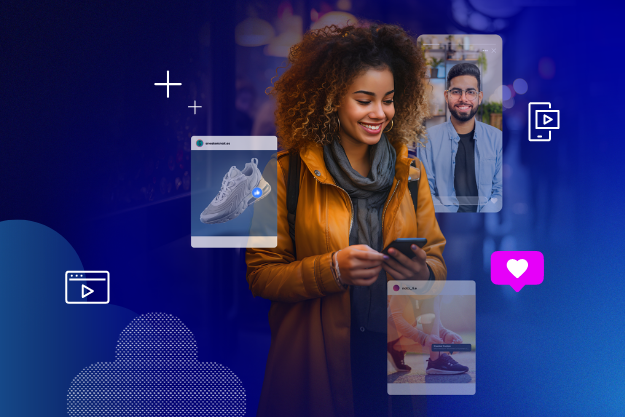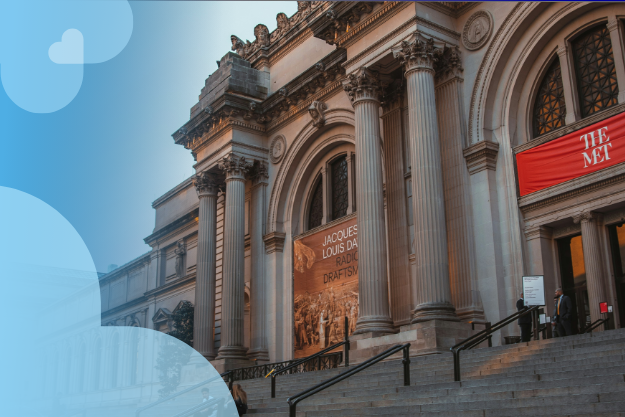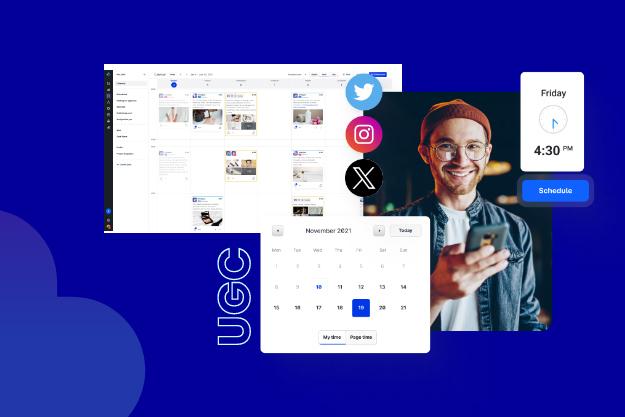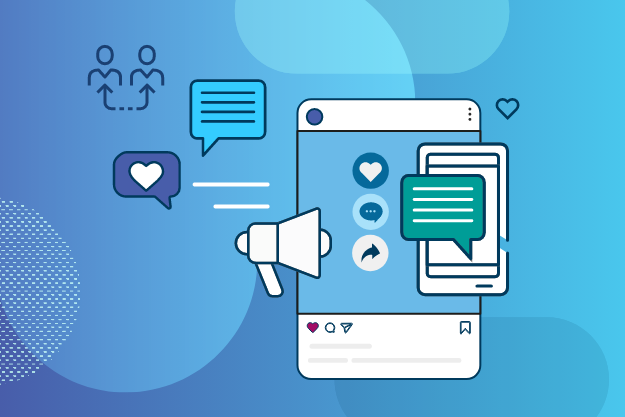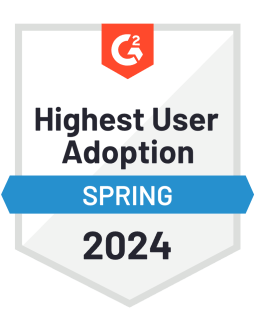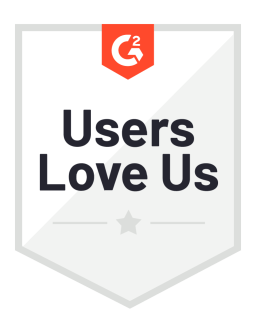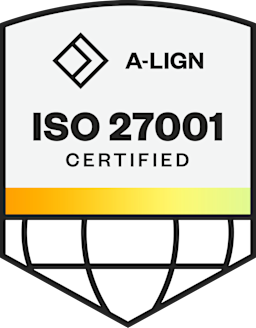Social media helps us connect with friends, family, and even strangers from halfway around the world. When used right, it can be a great way to nurture healthy relationships with people who share the same interests. However, social media can also breed negativity, which can affect people's mental health.
For some people, affirmation on social media in the form of likes and comments can affect self-esteem. Plus, several studies have also found a correlation between prolonged social media use and symptoms of anxiety, depression, and stress. That's why your brand's role in social media marketing is so critical. As someone who's in charge of a brand or business social media account, you are responsible for making a positive change in your community. Here are five helpful things you should know about mental health and social media.
1. Understand the need for positive messaging
With easy access to information, social media has become one of the top channels to get news. Yet the constant stream of negative news and content could have a harmful impact on mental health. And the trouble is that it still affects you, even if you're consuming the content passively while scrolling through your feed.
Constantly seeing disaster or sensational reporting can elevate stress levels and trigger anxiety and sleeping problems. What this means is you need to carefully plan your content so as not to add to the information overload.
You could make a difference by bringing in some positive messaging in the middle of all the negative content. That doesn't mean you shouldn't talk about pressing issues or current events at all. It just means that you should find a way to add a positive or inspirational twist to the topic.
For instance, you can ask your community what their favorite parts about working from home are, share the best ways to use your product or service while quarantining, or amplify positive posts like new job announcements or personal news to celebrate others. Giveaways and social media contests are also great ways to promote your brand while maintaining a positive attitude online.
PS Seasoning shares delicious photos and recipe ideas to inspire its cooking community on Instagram.
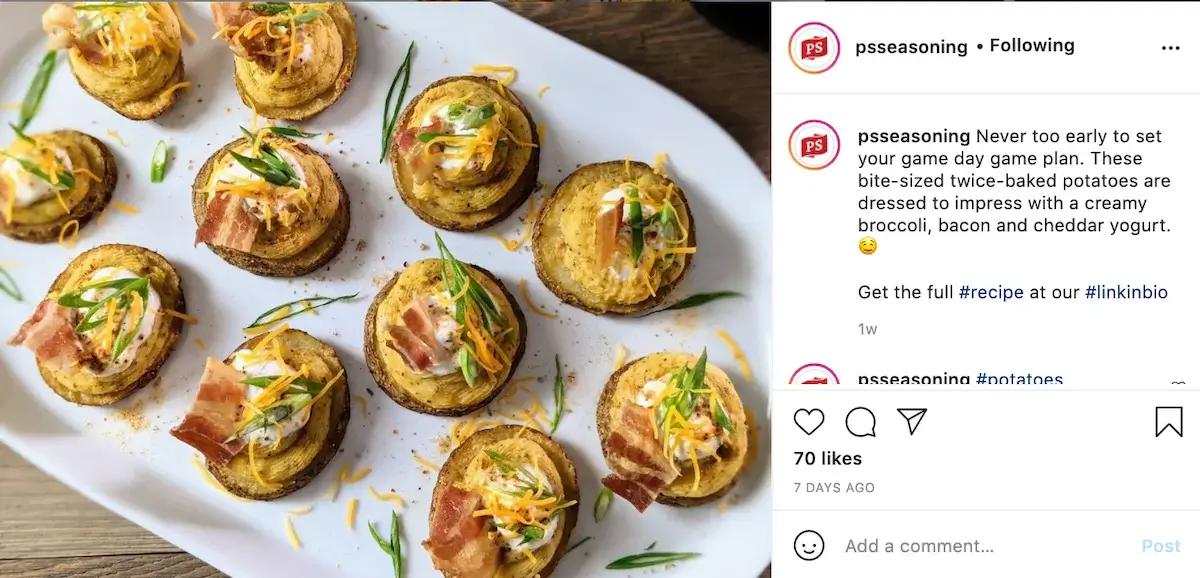
2. Build a strong, inclusive community with UGC
With people craving affirmation through social media, it's no surprise that many of them try to emulate social media perfection. So, we see people with perfect bodies and flawless skin living an enviable lifestyle of travel and luxurious experiences. Constantly seeing this type of content can trigger social media envy and fear of missing out in many people. This can then have an impact on their self-esteem. A systematic review of 16 papers even found that social media envy can lead to stress, anxiety, and depression.
This is why your role as a social media marketer should also involve nurturing a strong and inclusive community by sharing user-generated content (UGC) from your brand community. Make room for real people and their real experiences, including all their flaws and imperfections. The goal is to showcase and celebrate the real people out there, not just the "perfect" influencers and celebrities. This can help you build a positive community that's inclusive of everyone regardless of race, sexuality, or body type. Brands that make the most of UGC often use branded hashtags, contests, and online inspiration galleries to encourage their customers to share on social media how they use those products or services. Check out these user-generated content examples to begin creating a UGC campaign strategy that inspires your audience to participate. Milani Cosmetics uses its Instagram page to highlight real customers and influencers of diverse skin types and backgrounds instead of focusing just on professional, edited photos of models. This makes the brand's posts feel more authentic and relatable to customers scrolling through their feeds, and produces a welcoming, genuine atmosphere within the Milani's community.
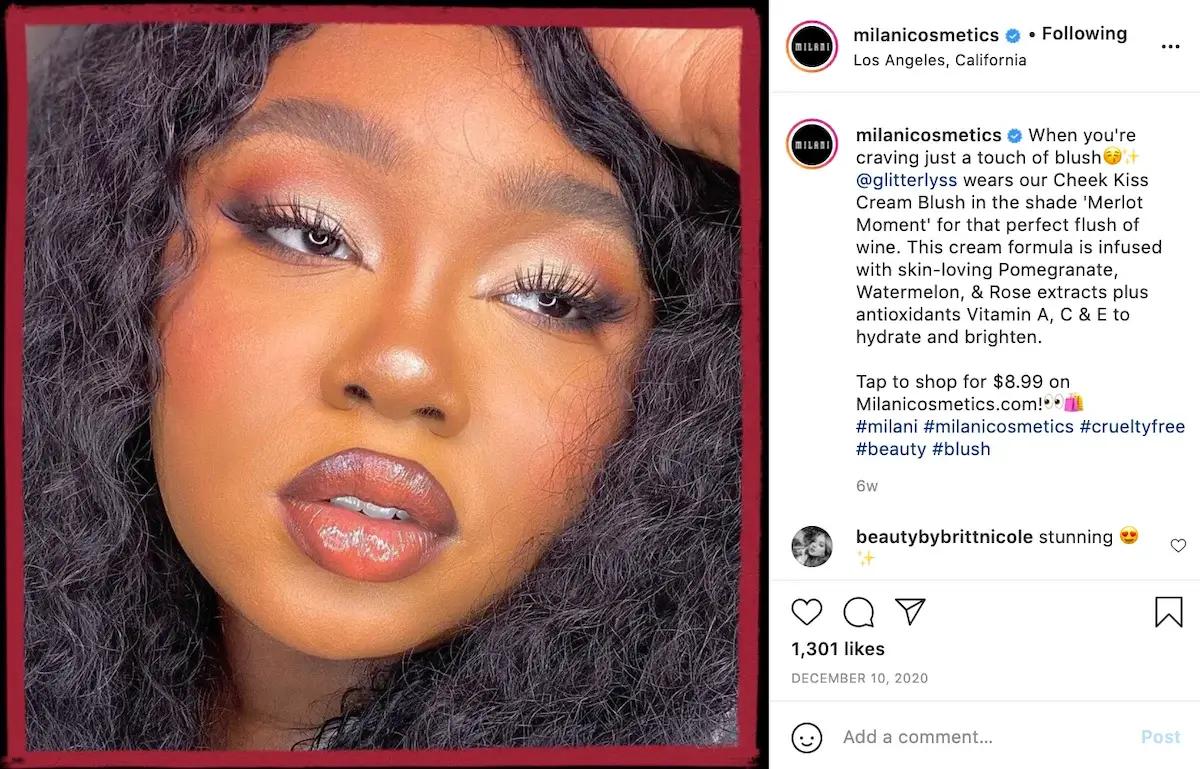
3. Leave no room for trolling and bullying
Creating and nurturing a positive community also means protecting the community from those who aim to harass its members. With easy access to the channel, social media makes room for all types of people – including bullies and trolls. These are people who tend to spread negativity with hurtful comments and posts. You can bet that this type of behavior can cause mental health issues or trigger existing symptoms for the victim. It can be particularly tough on teenagers. A study of 150 students between the ages of 16 and 18 brings light to the seriousness of this problem. The study found that 67% of those who were trolled experienced depression.
To make matters worse, those who experience bullying or cyberbullying can experience anxiety, low self-esteem, academic difficulties, suicidal thoughts, and many more. Not to mention, students who experience bullying or cyberbullying are almost twice as likely to attempt suicide. It's crucial that you adopt a "no tolerance" policy when it comes to this type of behavior. Use social media listening tools to keep a close eye on your audience. Look for any harmful comments and uses of flagged keywords to remove bullies and trolls from your community. The idea is to protect the mental health of your community by blocking out users who could harm them. This can only help nourish trust between your brand and its community members.
4. Openly discuss mental health to end the stigma
According to the World Health Organization, 264 million people suffer from depression globally. Bipolar disorder, for instance, affects about 45 million people worldwide, while schizophrenia and other psychoses affect 20 million.
This means that you never really know who's struggling with a mental health disorder within your community or your organization. Moreover, it doesn't help that negative social media experiences can fuel these symptoms. In fact, for every 10% rise in negative social media experiences, the risk of depression increased by 20%. And every 10% rise in negative social media experiences increased loneliness by 13%.
This makes it crucial to openly talk about mental health issues through your brand's social media at every valid opportunity. Talk openly about struggles with mental health issues by sharing stories and resources that could help those who are struggling. Provide your audiences with encouragement and inspiration through your posts, and do everything you can to make them feel included and comfortable as members of your brand's community.
The idea is to make them realize that they're not alone so that they don't feel too lonely or isolated. And this could have an impact on their social media experiences and eventually, their mental health. For instance, Refinery 29 shared some tips on how to hold on to the lessons learned in 2020. The tips were largely based on self-care and mental wellness.

5. It affects you, too
While you're busy taking care of everyone else's mental health, don't forget your own. Social media marketers and business owners are not impervious to social media. According to a survey by Dr. Pragya Agarwal, 80% of SMEs experienced stress and panic about their social media.
These feelings resulted from the pressure to be perfect and to keep up with the constantly changing technology. The endless struggle to gain more followers as well as the need to connect with influencers were also major causes.
It's crucial to take care of your mental health first, and promote mental wellness with your marketing efforts. Prioritize authenticity to nourish yourself and your community, and seek out an influencer marketing solution that reduces your own workload. Also, don't let your busy job get to your head. Use social media tools at your disposal to save you time and make you feel more confident and competent in your job.
Along with its many benefits, social media comes with its fair share of drawbacks. As a social media marketer, it's up to you to protect your community and promote positivity for better mental health. Make the most of the ideas above to get a head start.
Jacqueline Zote is a digital marketing and entertainment writer who makes regular contributions to Keyhole. Her interests range from pop culture and mythology to social activism. When she's not writing, she goes on food adventures and binges on crime drama. Her short fiction has been published by HarperCollins Publishers and Zubaan Books.
Editor's Note: This article was originally published on pixlee.com. Any statistics or statements included in this article were current at the time of original publication.














